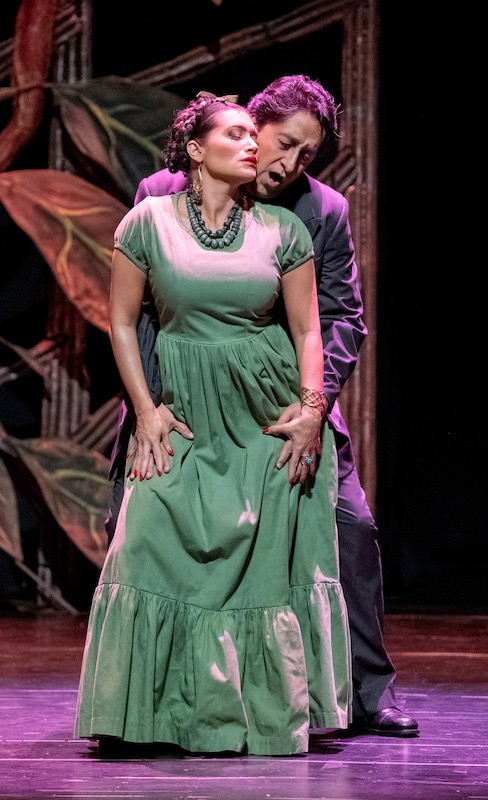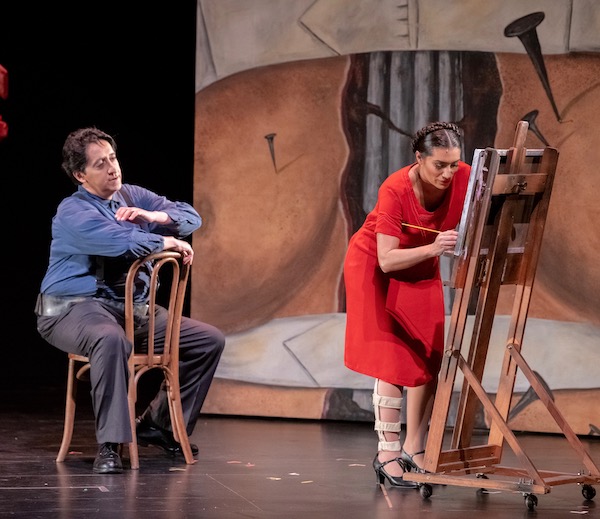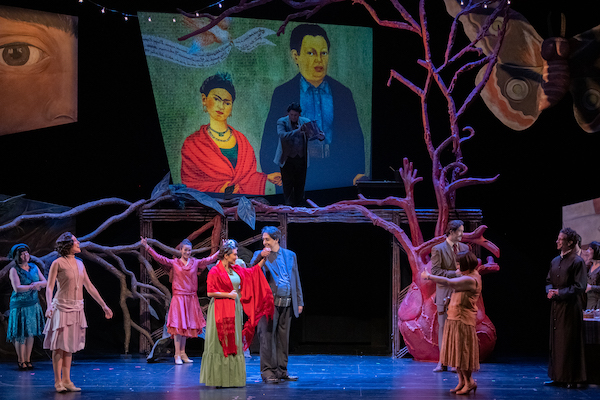Soprano Cuervo is a powerhouse in FGO’s episodic but colorful “Frida”

Catalina Cuervo stars as Frida Kahlo, with Ricardo Herrera as Diego Rivera, in Florida Grand Opera’s production of “Frida.” Photo: Chris Kakol
The magical, pain-wracked and sexually charged world of Frida Kahlo came to life on stage Saturday night, as Florida Grand Opera presented a production devoted to the Mexican artist who achieved superstar status decades after her death.
Written by the American composer Robert Xavier Rodríguez, Frida tells the story of the artist from her teen years to the end of her life, encompassing her stormy marriage to the muralist Diego Rivera, her devotion to indigenous Mexican culture and left-wing politics, and the bus accident that left her to face years of surgeries. The libretto, by Hilary Belcher and Migdalia Cruz, is a hybrid of opera and musical theater, with spoken dialogue in English and Spanish, some profanity and even a topless scene.
The production’s greatest strengths were the imaginative staging inspired by Kahlo’s paintings and a firecracker performance by soprano Catalina Cuervo, whose intensity and dramatic discipline effectively portrayed a woman who overcame horrific physical and emotional challenges to live a big life.
Yet despite all these juicy ingredients, the 1991 opera doesn’t quite come off. As a play, it lacked effective dialogue and theatrical punch. And as an opera, despite an imaginative and often attractive score, it doesn’t have the cumulative musical intensity and dramatic focus that characterize the art form at its best.
Frida feels most like a biopic, trying to hit all the bases: bus accident, first meeting with Rivera, trip to New York, arrival of Leon Trotsky, and so on that gave it an unfocused, episodic feeling.
And Kahlo herself, a proponent of Mexican culture who couldn’t stand the champagne-swilling millionaires of New York, might have been appalled to see her life used for this quintessentially European art form. (Or, considering the self-obsession revealed in her paintings, she might have been delighted.)
The performance took place at the 800-seat Miramar Cultural Center, rather than FGO’s usual larger venues at the Arsht Center and Broward Center. Even with the smaller hall, there were a lot of empty seats, further evidence that FGO’s brave forays into repertory beyond Carmen and La Traviata remain a tough sell with local audiences.
The team of set and costume designer Moníka Essen, director Marco Pelle and lighting designer Nate Wheatley created a weird and alluring on-stage world, in this production from Michigan Opera Theatre. Prominent were some of Kahlo’s most famous paintings, such as the 1944 work The Broken Column, a self-portrait of suffering, sexuality and stoicism that shows her torso split to reveal her backbone replaced by a cracked classical column. The stage action portrayed other paintings, with antler-wearing dancers pierced by arrows in imitation of her self-portrait, The Wounded Deer. Projections showed New York harbor, the communist hammer and sickle, and Kahlo and Rivera’s famous adjacent houses in Mexico City connected by a bridge.
Skull-masked Day of the Dead figures called Calaveras haunted the performance, sweeping through at difficult moments, serving as drivers in the fateful bus accident, and toward the end singing “She’s almost ours.”
Adding to the visual spectacle were the costumes, particularly important in this opera for Kahlo’s own vibrant use of dress and jewelry to express her Mexican identity. As Frida, Cuervo appears in elaborate Tehuana dress—bright primary colors of red, yellow and green, with big skirts, finely embroidered blouses and elaborate hats.
Rodriguez’s music is an effective combination of Mexican folk music, jazzy sounds and contemporary classical music, scored for a small orchestra that includes an accordion, guitar and saxophone. Rodriguez, who studied with Elliott Carter and Nadia Boulanger, can write a tune, and he did so with a dramatist’s touch here, working through melodies that would begin simply and then turn complex and discordant as the stage action intensified.
He captured the fortitude that is one of Kahlo’s defining characteristics, as she lay in bed after her accident, full of self pity, singing doleful music that turned racy and fiery as she resolved to live. He brought an almost Wagnerian eroticism to the love scene between Kahlo and her husband, with music that ascended, broke and then ascended higher. And he gave a real workout to “The Internationale,” with the communist anthem heard in heroic tones as demonstrators chant and reappearing in twisted, dissonant form as the outcast Soviet revolutionary Leon Trotsky shows up in Mexico, fleeing Stalin’s killers. Under conductor Roberto Kalb, the orchestra made the most of its spare forces, with a vigorous, colorful performance that never covered the singing.
In the role of Kahlo, Cuervo gave a focused, emotional performance that avoided the diva-like, over-the-top dramatics that might have seemed obvious for such a role. Singing with smooth vocal intensity, her portrayal was characterized by strength, vulnerability and sensuality. Kahlo’s emotional exposure came through, as she sang sadly from her hospital bed of surrendering her youthful dreams. Yet she brought immense strength and moral force to the performance, as she reprimanded Rivera for cavorting with tuxedoed New York plutocrats while there were people outside with nothing to eat.
During her years as a painter, Kahlo was overshadowed by Rivera, her older, larger-than-life husband (who would be dismayed to learn that, in this age of Fridamania, he has become Mr. Frida Kahlo). The bass-baritone Ricardo Herrera may have lacked the imposing physical presence of the tall, overweight Rivera, but he brought to the role a big bear-like voice and a subtle stage manner. He could express thunderous anger at the Communist true believers who questioned his art and move swiftly to seductive, erotic charm as he conquered a string of women.
The singers, who were all discreetly amplified throughout, were all easy to understand, thanks to their careful diction and a spare musical score that put a premium on allowing the audience to hear the words.
Jessica E. Jones sang with polish as Kahlo’s sister Cristina, portraying her as a model of sense and respectability, until she couples with Rivera too. Zaray Rodriguez was affecting as the mother of a dead baby and then as Rivera’s seductive, jealous girlfriend.
As Nelson Rockefeller, who ordered Rivera’s New York mural destroyed because it featured an image of Lenin, Benjamin Dickerson was the model of the arrogant gringo, managing a grating American accent in telling Rivera, “Hasta luego.”
Frida will be repeated 3 p.m. Sunday at the Miramar Cultural Arts Center; 8 p.m. Thursday, 7 p.m. Saturday and 3 p.m. March 24 at the Miami-Dade County Auditorium in Miami; and 7:30 p.m. March 28 and 30 at Parker Playhouse in Fort Lauderdale. fgo.org; 800-741-1010
Posted in Performances
4 Responses to “Soprano Cuervo is a powerhouse in FGO’s episodic but colorful “Frida””
Leave a Comment
Sun Mar 17, 2019
at 3:10 pm
4 Comments






Posted Mar 18, 2019 at 9:51 am by wolfgang731
I feel that your assessment that FGO audiences wouldn’t enthusiastically support a production other than the warhorses you indicated is rather unfair. There’s a distinct difference between programming lesser known/produced works by major composers and programming works such as Frida with apparently limited appeal and/or production history. I understand what Susan Danis set out to achieve but I think her experiment in programming works that she felt may resonate with the areas demographic, while admirable, has proven to be somewhat shortsighted from both an artistic and financial perspective.
Considering the vast repertoire that FGO has to choose from and considering the state of classical music/opera in the U.S. in the current climate, it doesn’t really make any kind of sense to regularly program obscure scores that few, if any, have either heard of or are interested in. I doubt that Frida would attract large audiences anywhere, regardless of its artistic merits.
Posted Mar 29, 2019 at 11:28 am by Jung
Thursday 3-29-19 the Parker Playhouse was filled “to the rafters”… packed. The public was deservedly very enthusiastic. Maybe Miramar is a bad venue for this. This is an historic, biographical musical theater experience. Unlike most dramas it misses a central “issue” whether it be a love story or twist which makes for drama/operas. Thoroughly enjoyable performance by Cuervo and wonderfully produced. I doubt that without this production it would be reproduced successfully anywhere else.
Posted Mar 31, 2019 at 12:22 am by Dr. Gloria Waldman
Solid, moving, emotionally convincing, with wonderful scenery and successsful use of her and his original paintings to frame the opera.
As someone who has taught the Hayden Herrera biography and Frida since 1973, it was very satisfying.
Gloria Waldman
Posted May 01, 2019 at 3:56 pm by Nadia Greenidge
I have seen this production 6 times and each time it seems better and better. Cuervo was amazing and Rodriguez is pure genius. The warehouse old operas are solid but will not bring in new faces. Rodriguez and others like him are the future of opera and we had a lot of new patrons wanting more just like this. We need new operas including Frida to have any chance for a future. Frida sold out at FGO and was amazing, all 6 times.